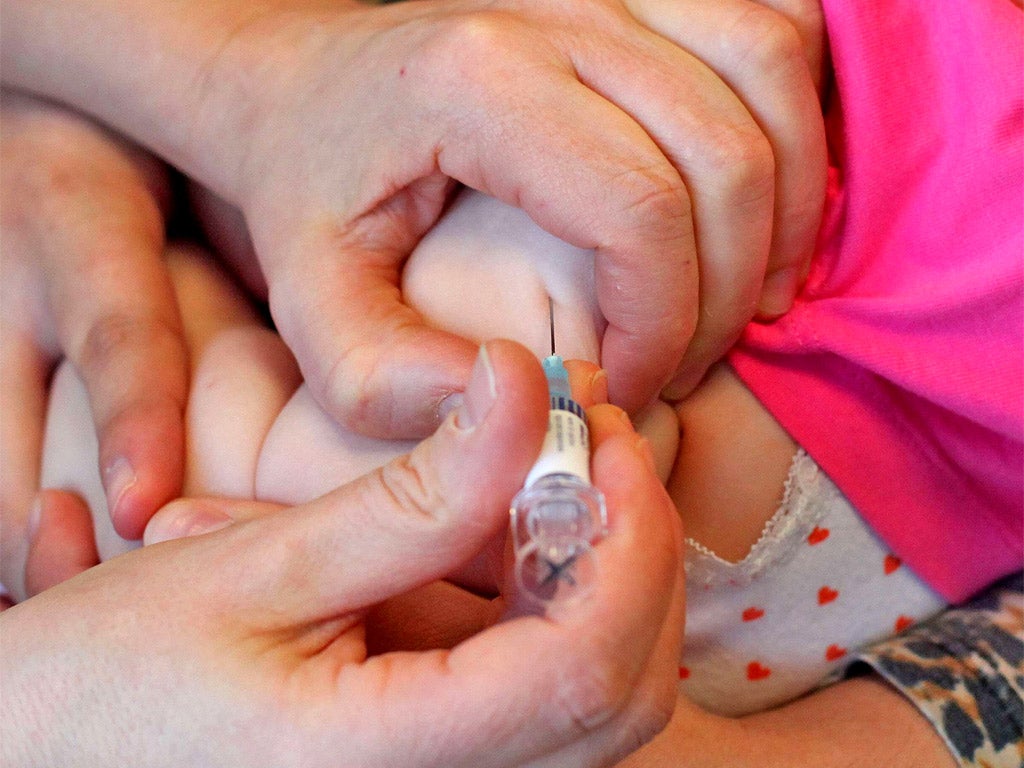Measles outbreak: race to give a million children MMR jabs

One million children who missed out on the MMR vaccine around a decade ago are to be targeted in a national campaign to raise the level of protection against measles.
Alarmed by the Swansea outbreak, where almost 900 people have been diagnosed with the disease, Public Health England is appealing today to parents of children who missed one or both of the MMR jabs before the age of five to send them for vaccination.
Measles was virtually eliminated in the 1990s following the introduction of MMR vaccine after the disease infected over 500,000 children a year in the 1950s and 1960s. But the disease re-established itself in the mid-2000s following an unfounded scare linking MMR to autism which caused many parents to abandon the vaccine.
Immunisation rates fell nationally to less than 80 per cent in 2005. Older children who missed their vaccinations are now the most vulnerable.
Dr Mary Ramsay, head of immunisation at Public Health England, said children born in 2001-02, who are now just starting secondary school, had the highest rate of non-vaccination, and this was also the age group in which measles cases were highest. "We have a legacy of older children who were not vaccinated as toddlers. They are now at secondary school where measles can spread very effectively. We estimate a third of a million 10- to 16-years-olds are completely unvaccinated," she said.
London and the South-east are at greatest risk of outbreaks because the region's traditionally more mobile population made families more difficult to track.
Dr Ramsay said: "Measles is a potentially fatal but entirely preventable disease so we are very disappointed that cases have recently increased. The only way to prevent outbreaks, such as the one we are seeing in South Wales, is to ensure good uptake of the MMR vaccine across all age groups. Measles is not a mild illness – it is very unpleasant and can lead to serious complications."
The campaign will also target the third of a million 10- to 16-year-olds who had only one vaccination, as well as children younger than 10 and older than 16 who also missed the jabs, numbering a further third of a million. The aim is to complete the £20m campaign by September.
Unvaccinated children will be identified from GP records, where possible, and their parents will be contacted. But experts urged parents not to wait for a letter but bring their children to vaccination clinics to be provided in GP surgeries, schools and health centres.
Professor David Salisbury, director of immunisation at the Department of Health, said it had stockpiled 1.2 million doses of vaccine, enough for every unvaccinated child. "The message is very simple: if you don't believe your children had two doses of MMR make an appointment with your GP," he said. Children are offered an MMR vaccine at 12 to 13 months, giving 95 per cent protection, and a second dose at three-and-a-half, which boosts this to 99 per cent.
The last drive to increase MMR vaccination levels in 2008 had only limited success. But Professor Salisbury said the new campaign would be better co-ordinated, with a higher profile. "This time we have got evidence of risk [from Swansea] that is so clear. We didn't have that last time."
About one in 15 children who catch measles will develop complications like deafness, meningitis or brain damage. One in 5,000 will die. The year before the MMR was introduced, 86,000 children caught measles and 16 died. Because it spreads easily, 95 per cent of the population needs to be vaccinated. There have been two deaths in recent years – in 2006 and 2008 – after over a decade of none. Fifty years ago, the illness killed 500 children a year in the UK, but vaccination almost eliminated it.
Vaccination rates vary widely but are at their lowest in London where, in some areas, they dropped as low as 30 per cent in the mid-2000s. Cases of measles so far this year are distributed across England but are highest in the North-west and North-east.
Of the 108 people who have been admitted to hospital with measles this year – 20 per cent of those infected – 15 had complications including pneumonia, meningitis and gastroenteritis.
Dr Paul Cosford, director of health protection at Public Health England, said letters and flyers about the campaign would be distributed to schools and messages would be posted on Facebook and Twitter.
"Nationally the numbers needing catch-up vaccination are quite large but there are relatively few in each local area. We are confident that local teams have the resources to identify and vaccinate those children most at risk, and that the NHS has sufficient vaccine. Our plan aims to target 'hard to reach' populations with known low vaccination rates."
Join our commenting forum
Join thought-provoking conversations, follow other Independent readers and see their replies
Comments
Bookmark popover
Removed from bookmarks